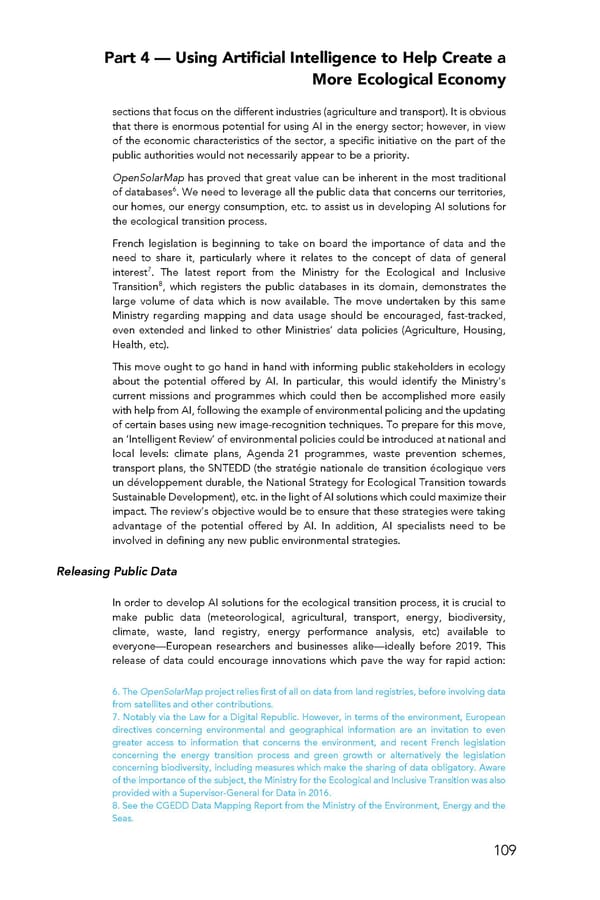Part 4 — Using Artificial Intelligence to Help Create a More Ecological Economy sections that focus on the different industries (agriculture and transport). It is obvious that there is enormous potential for using AI in the energy sector; however, in view of the economic characteristics of the sector, a specific initiative on the part of the public authorities would not necessarily appear to be a priority. OpenSolarMap has proved that great value can be inherent in the most traditional of databases6. We need to leverage all the public data that concerns our territories, our homes, our energy consumption, etc. to assist us in developing AI solutions for the ecological transition process. French legislation is beginning to take on board the importance of data and the need to share it, particularly where it relates to the concept of data of general interest7. The latest report from the Ministry for the Ecological and Inclusive Transition8, which registers the public databases in its domain, demonstrates the large volume of data which is now available. The move undertaken by this same Ministry regarding mapping and data usage should be encouraged, fast-tracked, even extended and linked to other Ministries’ data policies (Agriculture, Housing, Health, etc). This move ought to go hand in hand with informing public stakeholders in ecology about the potential offered by AI. In particular, this would identify the Ministry’s current missions and programmes which could then be accomplished more easily with help from AI, following the example of environmental policing and the updating of certain bases using new image-recognition techniques. To prepare for this move, an ‘Intelligent Review’ of environmental policies could be introduced at national and local levels: climate plans, Agenda 21 programmes, waste prevention schemes, transport plans, the SNTEDD (the stratégie nationale de transition écologique vers un développement durable, the National Strategy for Ecological Transition towards Sustainable Development), etc. in the light of AI solutions which could maximize their impact. The review’s objective would be to ensure that these strategies were taking advantage of the potential offered by AI. In addition, AI specialists need to be involved in defining any new public environmental strategies. Releasing Public Data In order to develop AI solutions for the ecological transition process, it is crucial to make public data (meteorological, agricultural, transport, energy, biodiversity, climate, waste, land registry, energy performance analysis, etc) available to everyone—European researchers and businesses alike—ideally before 2019. This release of data could encourage innovations which pave the way for rapid action: 6. The OpenSolarMap project relies first of all on data from land registries, before involving data from satellites and other contributions. 7. Notably via the Law for a Digital Republic. However, in terms of the environment, European directives concerning environmental and geographical information are an invitation to even greater access to information that concerns the environment, and recent French legislation concerning the energy transition process and green growth or alternatively the legislation concerning biodiversity, including measures which make the sharing of data obligatory. Aware of the importance of the subject, the Ministry for the Ecological and Inclusive Transition was also provided with a Supervisor-General for Data in 2016. 8. See the CGEDD Data Mapping Report from the Ministry of the Environment, Energy and the Seas. 109
 For a Meaningful AI - Report Page 109 Page 111
For a Meaningful AI - Report Page 109 Page 111